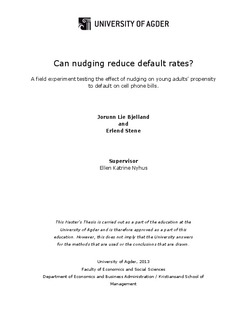Can nudging reduce default rates? : a field experiment testing the effect of nudging on young adult´s propensity to default on cell phone bills
Master thesis
Permanent lenke
http://hdl.handle.net/11250/135891Utgivelsesdato
2013Metadata
Vis full innførselSamlinger
Sammendrag
Can altering the context in which people make their decisions be an effective method for reducing default rates? This thesis reports the results of an experiment that tested the effect of so-called «nudging» on young adults’ decision-making process concerning bill payments. Based on theories of judgment and decision-making, text messages were sent out to 2500 randomized treatment and control subjects aged 18-30, pulled from One Call’s (Network Norway AS) customer base. Incoming payments were then recorded to determine whether the messages had influenced customers’ decision to pay their bill within due. The results provide evidence that nudging may positively influence people’s decisions, and subsequently reduce default rates, if the nudge is executed correctly.
The aim of this study has been to test existing theories and models in this field of research in a new context, thereby contributing to further development and hopefully active use of nudging as a positive alternative to regulations. This could benefit each individual being nudged, and ultimately bring out positive larger scale societal changes. Our hope is that companies that deal with payment collection will benefit from this research. Although former studies have shown the effect of nudging in different contexts, the results might not be directly transferrable to payment rates. We have therefore opted to empirically test the effect of nudging in a new context; on customers’ payment behavior.
Beskrivelse
Masteroppgave i økonomi og administrasjon - Universitetet i Agder 2013
